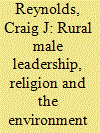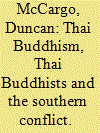| Srl | Item |
| 1 |
ID:
101920


|
|
|
|
|
| Publication |
2011.
|
| Summary/Abstract |
By considering the historical significance of a southern Thai policeman, Khun Phantharakratchadet (1898-2006), I aim to shift historical writing away from the court, the aristocracy and the capital even though the social setting is not merely 'local' or 'peripheral' but an amalgam of elements found throughout the country. I also want to give credit to local historians often dismissed for being parochial, untheoretical and disposed to myth-making, and to show how tantric practices (saiyasat), the arts of self-defence, policing, banditry and masculinity intersect in the career of this policeman, a native of the unique environment in the Songkhla lakes district.
|
|
|
|
|
|
|
|
|
|
|
|
|
|
|
|
| 2 |
ID:
096566


|
|
|
|
|
| Publication |
2009.
|
| Summary/Abstract |
Thailand's 'southern border provinces' of Pattani, Yala and Narathiwat - along with four districts of neighbouring Songkhla - are the site of fiery political violence characterised by daily killings. The area was historically a Malay sultanate, and was only loosely under Thai suzerainty until the early twentieth century. During the twentieth century there was periodic resistance to Bangkok's attempts to suppress local identity and to incorporate this largely Malay-speaking, Muslim-majority area into a predominantly Buddhist nation-state. This resistance proved most intense during the 1960s and 1970s, when various armed groups (notably PULO [Patani United Liberation Organization] and BRN [Barisan Revolusi Nasional]) waged war on the Thai state, primarily targeting government officials and the security forces. In the early 1980s, the Prem Tinsulanond government brokered a deal with these armed groups and proceeded to co-opt the Malay-Muslim elite. By crafting mutually beneficial governance, security and financial arrangements, the Thai state was able largely to placate local political demands.
|
|
|
|
|
|
|
|
|
|
|
|
|
|
|
|